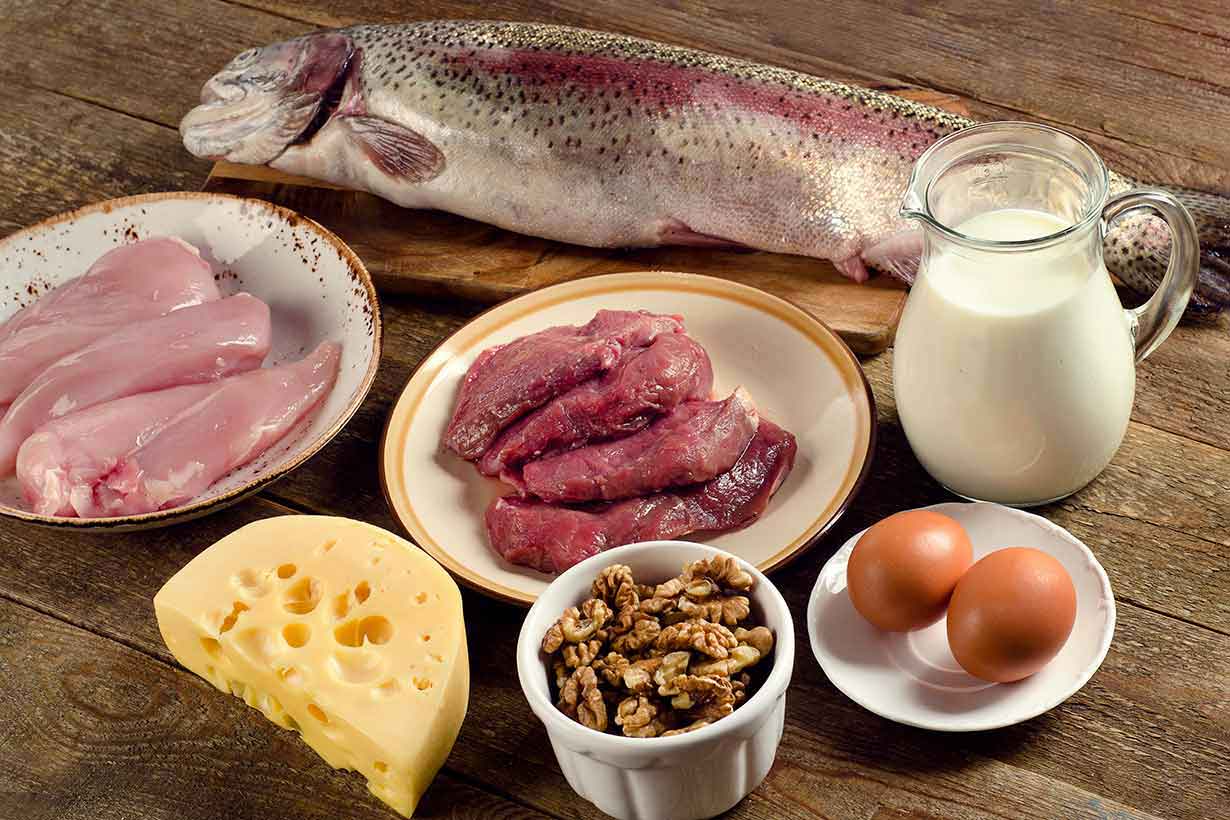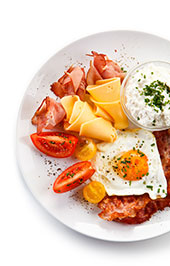
A high protein, low carb diet is one that can have many health benefits.
In particular, the diet can be a useful tool for those looking to lose weight or gain muscle.
This article provides a list of the most nutritious high protein, low carb foods.
For each food, you can view the calories, protein and carbohydrate content per 100g.
1. Eggs
- Calories: 145 kcal
- Protein: 12.6 g
- Carbs: 0.8 g
Eggs are one of the best foods you can eat for all sorts of reasons.
For one thing, they are nutrient-packed and contain almost every essential vitamin and mineral.
In addition to this, eggs are the most bio-available form of protein in the world (1).
Compared to other sources of protein, you absorb far more of the protein you eat. This is particularly the case if we compare eggs to lower quality plant proteins such as soy and beans.
In short, cook up some eggs for a tasty and nutritious low carb, high protein breakfast.
2. Pork Chop
- Calories: 197 kcal
- Protein: 26.6 g
- Carbs: 0 g
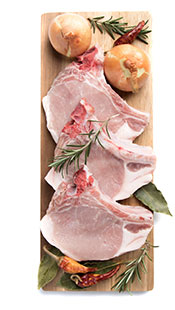
There are many cuts of pork, but chops are one of the tastiest options.
Pork chops contain a decent nutrient profile too, and they provide a range of B vitamins, magnesium, and zinc among others (2).
An interesting fact about pork is that the primary fatty acid is oleic acid, a type of monounsaturated fat (3).
This fat happens to be the very same fatty acid that receives praise for being “heart healthy” in olive oil.
Overall, pork chops are a nutrient-dense, high protein and low carb food that tastes delicious.
3. Tuna
- Calories: 128 kcal
- Protein: 23.6 g
- Carbs: 0 g
A tin of canned tuna is the ultimate convenience food.
It’s ready packaged, pre-cooked, and you can eat it pretty much anywhere.
Additionally, since it’s extremely low in both fat and carbohydrate, it’s one of the most protein-dense food options. Couple the protein with the B vitamins and selenium tuna provides, and you have a relatively nutritious food (4).
While it’s not as beneficial as fresh tuna (since it’s usually missing the omega-3), it’s a quick, healthy option.
These qualities encourage using it in cooking for a quick meal rather than opting for an unhealthier prepared meal.
4. Cheese (Parmesan)

- Calories: 431 kcal
- Protein: 38.5 g
- Carbs: 4.1 g
Cheese has to be one of the most delicious foods in the world.
Adding it to almost anything, from cheeseburgers to pizzas, makes that food taste so much better.
Fortunately, cheese is quite a healthy option too, and it provides a significant amount of calcium, phosphorus, and B vitamins (5).
While cheese was once feared for its fat content, recent studies are proving that it has some impressive health benefits.
For instance, a recent systematic review of 52 clinical trials demonstrated that fermented dairy fat has significant anti-inflammatory actions (6).
5. Lamb
- Calories: 283 kcal
- Protein: 24.7 g
- Carbs: 0 g
Lamb is a healthy food that is packed with nutrients.
Notably, it’s an impressive source of B vitamins, iron, zinc and selenium (7).
Similar to other types of meat, lamb offers a significant amount of protein too; it is approximately 25% protein by weight.
Red meats such as beef and lamb are particularly important for their iron content since iron-deficiency anemia has skyrocketed over the past decade, particularly in young women (8).
Lamb also provides a source of creatine, taurine, and the body’s “master antioxidant” glutathione.
6. Steak
- Calories: 212 kcal (Porterhouse)
- Protein: 26.1 g
- Carbs: 0 g
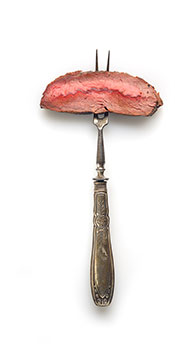
We can attribute pretty much all the benefits of lamb to steak too.
Since both are red meat, they have a relatively similar nutrient profile; lamb offers slightly more of some nutrients, and vice-versa.
Steak is one of the most popular high protein foods due to its delicious taste, and it commands a higher price than most meat.
The protein content is variable, depending on whether you opt for a fatty or lean cut of steak.
7. Lean Ground Beef
- Calories: 214 kcal
- Protein: 26.6 g
- Carbs: 0 g
While lean beef isn’t as tasty, it is an option for those wanting to maximize their protein intake.
Firstly, ground beef is much cheaper than steak, which makes it an affordable option for more people.
Additionally, it can be used in a wide range of recipes or for making homemade burgers – just combine it with a bit of salt and black pepper.
Although ground beef is lower in price, it still has all the nutritional benefits of more expensive cuts of meat.
All in all, lean ground beef is an economical protein choice that opens up the benefits of beef to more people.
8. Cottage Cheese (1% milkfat)
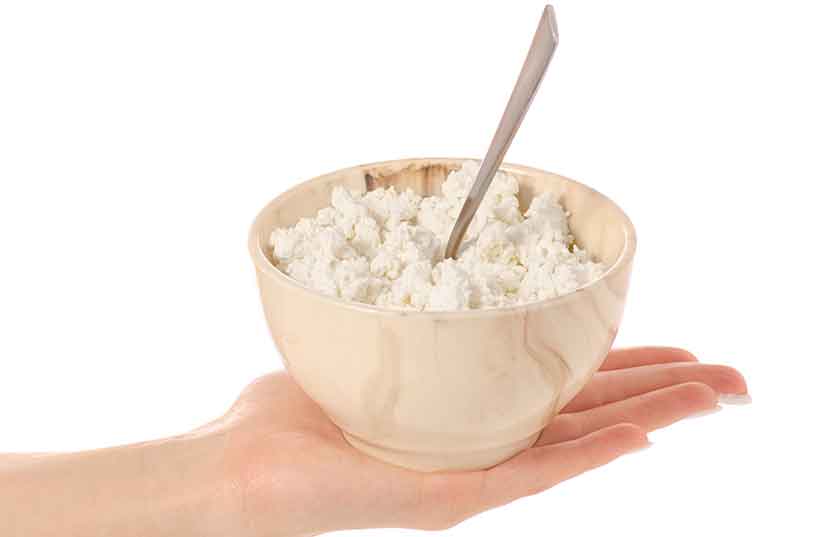
- Calories: 72 kcal
- Protein: 12.4 g
- Carbs: 2.7 g
Cottage cheese is a fermented dairy food that tends to be low in both carbohydrate and fat.
The result? An extremely protein-rich option that works as a snack or as part of a meal.
While the amount of protein per 100g may seem smaller than the other foods, the protein to calories ratio is very impressive.
Cottage cheese offers a variety of vitamins and minerals too. Similar to most dairy products, it is a good source of calcium, phosphorus and B vitamins (9).
9. Chicken Breast
- Calories: 165 kcal
- Protein: 31 g
- Carbs: 0 g
If you want the tastiest option, then a whole roasted chicken basted in butter and herbs is the hands-down winner.
Perhaps chicken drumsticks would come in second place, but if you want the most protein-dense option?
It has to be chicken breast.
In fact, chicken breasts are 31% protein by weight and, while not the tastiest food, they’re a good source of nutrition too.
For instance, one small chicken breast provides significant amounts of selenium, phosphorus, and B vitamins (10).
To add more flavor, chicken breasts work well in stir-fries and curries.
10. Beef Liver
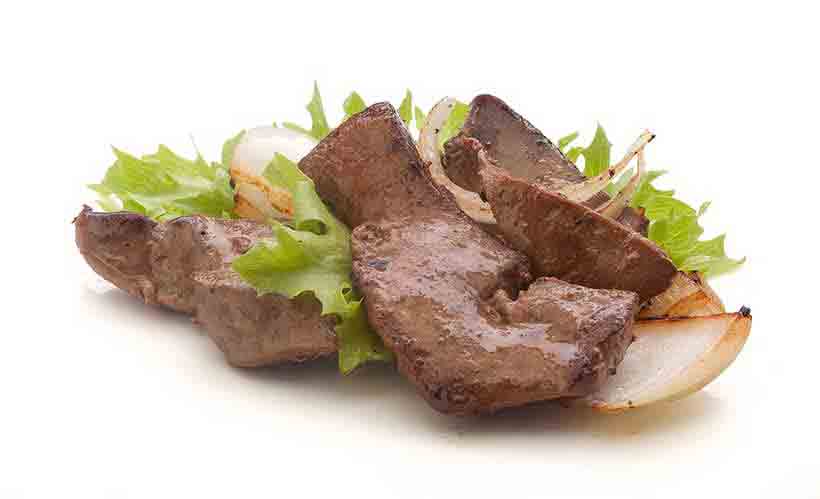
- Calories: 191 kcal
- Protein: 29.1 g
- Carbs: 5.3 g
From protein to vitamins and minerals, liver is the king when it comes to nutritional value.
Beef liver offers everything that regular beef does, but it provides multiples of the nutrients.
It also offers micronutrients that regular beef is lacking, as shown in the side-by-side table below.
The percentages are based on the %RDA values per 100g (11, 12);
| Nutrient | Beef | Beef Liver |
| Vitamin A | 0% | 634% |
| Vitamin C | Minimal | 3% |
| Vitamin E | 2% | 3% |
| Vitamin K | 2% | 4% |
| Vitamin B1 | 3% | 13% |
| Vitamin B2 | 11% | 201% |
| Vitamin B3 | 29% | 88% |
| Vitamin B5 | 8% | 71% |
| Vitamin B6 | 21% | 51% |
| Vitamin B12 | 48% | 1176% |
| Calcium | 3% | 1% |
| Iron | 15% | 36% |
| Magnesium | 6% | 5% |
| Phosphorus | 23% | 50% |
| Potassium | 11% | 10% |
| Zinc | 43% | 35% |
| Copper | 4% | 714% |
| Manganese | 1% | 18% |
| Selenium | 31% | 52% |
Compared to most foods, the nutrient profile of beef is impressive. But liver is probably the most nutrient-dense food on earth.
11. Salmon (Wild, Atlantic)
- Calories: 182 kcal
- Protein: 25.4 g
- Carbs: 0 g
Salmon is one of the healthiest types of seafood.
It is an oily fish that supplies large amounts of omega-3, and it is one of the cleanest fish in the sea too.
In addition to the omega-3 content and low-mercury contamination, salmon is a decent source of protein and nutrients. It even contains an antioxidant known as astaxanthin that may help protect against UV damage (13, 14).
One of the greatest things about salmon is just how good it tastes.
Salmon steak topped with a cheese and mushroom cream sauce is one of my favorite dishes.
For those who enjoy sashimi, it tastes great raw too.
12. Cod
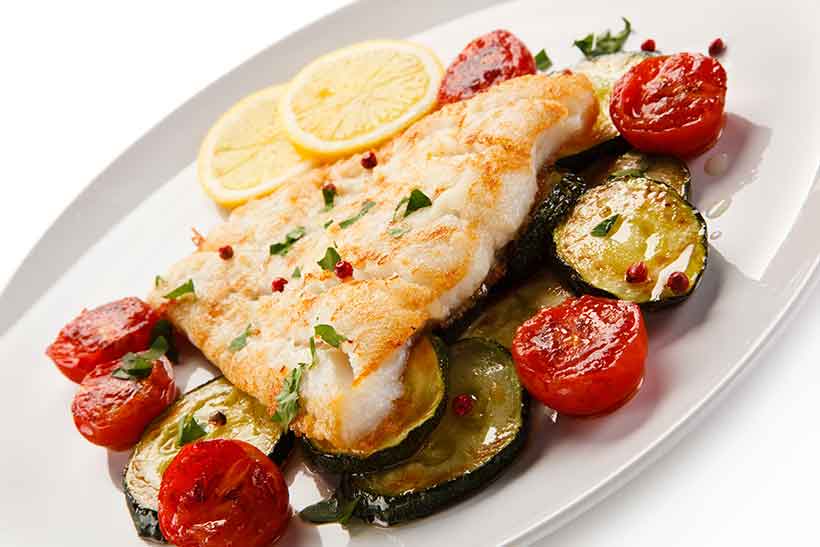
- Calories: 105 kcal
- Protein: 22.8 g
- Carbs: 0.9 g
Another excellent source of protein without the carbs is cod.
Cod is a relatively lean fish that lives in the Atlantic ocean, and it’s possibly the fish with the highest protein to calorie ratio.
On the positive side, cod also provides a wide range of nutrients, and it is especially high in selenium and the B vitamins (15).
It plays a role in a wide variety of traditional foods too, such as fish pie and fish and chips.
A simple recipe that tastes great is a standard fillet of cod with some butter and parsley sauce.
13. Shrimp
- Calories: 106 kcal
- Protein: 20.3 g
- Carb: 0.9 g
Shrimp is an incredibly nutrient-dense shellfish.
First of all, these crustaceans contain significant amounts of protein despite a very low carbohydrate and fat content.
Furthermore, they’re a significant source of micronutrients too and contain every vitamin and mineral there is.
Among these nutrients, shrimp is especially high in selenium, B vitamins, and phosphorus. Shrimp also provides a rare source of dietary choline, a nutrient that can play a preventive role in the development of disease (16, 17).
14. Protein Powder (Whey Isolate)
- Calories: 370 kcal
- Protein: 88.3 g
- Carbs: 0.6 g
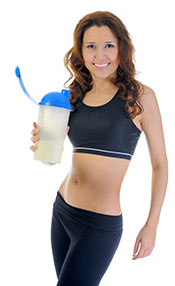
Firstly, let’s just clarify that it’s always better to get nutrients from food rather than supplements.
However, for those wanting to increase their protein intake, protein powders like whey and casein can be an efficient option.
These protein supplements provide a decent serving of protein for very few calories, have virtually zero carbs, and they’re quite economical too.
However, be careful about what you buy because many of these supplements are full of unnecessary ingredients.
For instance, some products contain things like vegetable oils, artificial colors, and sometimes even hormonal “boosters”.
You can see a range of healthier options here.
15. Sashimi (Salmon)
- Calories: 208 kcal
- Protein: 20.4 g
- Carbs: 0 g
Raw fish is not for everyone, but for those who enjoy it, sashimi is a good option.
With the same nutrition profile as cooked fish, sashimi is high in protein, low in carbs, and it offers a wealth of nutrients. In my opinion, it’s delicious too.
As a traditional Japanese food, it certainly hasn’t done any harm to Japan’s historically long-lived population either.
On the negative side, sashimi has been known to harbor foodborne parasites (18).
Similar to all raw food, if you are preparing it yourself, then it’s important to take adequate precautions and follow correct chilling instructions.
Why No Plant-Based Protein?
You may have noticed, but all the foods listed in this article are animal foods.
The reason why is simple; animal foods are the most complete and bio-available sources of protein we have.
However, if you are looking for a healthy plant-based choice, then fermented soy, beans, and lentils are among the best options.
See this in-depth review of animal proteins versus plant proteins for further information.
Final Thoughts
Each of the foods in this list has a common similarity; they are all high protein, low carb, and very nutritious.
Including a nutrient-dense source of protein at each meal can bring a lot of health benefits.

